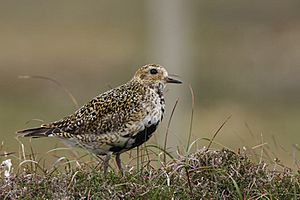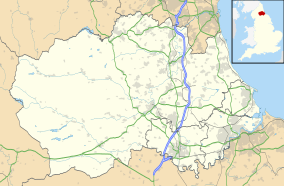Hexhamshire Moors facts for kids
Quick facts for kids Hexhamshire Moors |
|
|---|---|
| Location | Wear Valley, Durham Tynedale, Northumberland, North East, England |
| Area | 9,434 ha (36.42 sq mi) |
| Established | 1998 |
| Governing body | Natural England |
| Website | Map of site |
Hexhamshire Moors is a huge area of wild, open land in northern England. It's a very special place because of its unique plants and animals. This area is so important that it's called a Site of Special Scientific Interest (SSSI). This means it's protected to help keep its nature safe.
Contents
Hexhamshire Moors: A Special Wild Place
Hexhamshire Moors covers a large part of the uplands in north-west County Durham and south-west Northumberland. It is mostly a rectangular area. It sits between the valleys of the River East Allen to the west and Devil's Water to the east.
The southern part of Hexhamshire Moors is next to another SSSI called Muggleswick, Stanhope and Edmundbyers Commons and Blanchland Moor. It is also very close to the Allendale Moors SSSI.
Unique Habitats
This area has one of the largest stretches of blanket bog and heathland in northern England. A blanket bog is a type of wetland that covers large, flat areas like a blanket. Heathland is open land with small shrubs.
You can also find acid bogs here. These form near wet spots called flushes that drain water from the moorland. Some parts have acid grassland, which grows where sheep often graze.
Amazing Plants
While many plants here are common, Hexhamshire Moors is home to some rare species. One is the bog orchid (Hammarbya paludosa). This tiny orchid grows on the blanket peat, which is a type of soil made from decayed plants.
Another rare plant is the forked spleenwort (Asplenium septentrionale). This fern has only been found in one spot in Northumberland. It's the only known record for this county so far.
Important Birds

The main reason Hexhamshire Moors is so important is its many breeding birds. It has nationally important populations of several bird species.
Three of these birds need special protection:
- Merlin (a small falcon)
- Eurasian golden plover (a type of wading bird)
- Short-eared owl
These three are listed in Annex 1 of the European Commission's Birds Directive. This directive is a law that helps protect wild birds across Europe.
Other important birds found here include:
- Red grouse
- Eurasian curlew
- Common redshank
- Eurasian oystercatcher
- Dunlin
These birds are listed in the United Kingdom's Red Data Book (Birds). This book lists species that are at risk and need conservation efforts.
Tiny Creatures
The moorland heath also supports many different invertebrates. These are small creatures without backbones, like insects. Several rare types of ground beetle (Carabidae) live here.
Hexhamshire Moors is also part of the North Pennines Area of Outstanding Natural Beauty. This means it's a beautiful landscape that is protected for its special scenery and wildlife.


